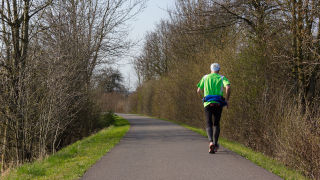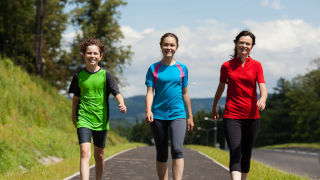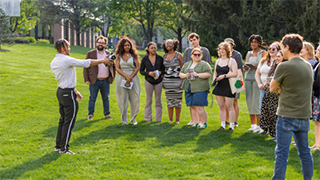5 Paths to Ethical Outdoor Physical Exercise - Seton Hall University
Tuesday, April 28, 2020

In many places, athletic activity, sport, and exercise in general are grinding to a halt — and with good reason. As healthcare professionals treat the sick and researchers work to develop a vaccine, the strongest contribution many of us can offer in the fight against COVID-19 is to distance ourselves from others. Yet we know that exercise is conducive to health — as daily physical activity has been shown to contribute to healthier lifestyles, better mental focus, and an increased sense of well-being. How should we proceed? Is it ethically permissible to exercise?

- Change the time. Whether its cycling or running, if you get out early you can typically beat the "traffic" out on the roads or on the running paths. Less traffic on roads, sidewalks, and running paths makes proper social distancing possible and reduces the chance of an accident and the need for medical attention from an overly stressed healthcare system.
- Change your goals. Now is not the time to go for a personal record through maximal efforts. Maximal effort workouts raise the chance of injury and the need for medical services from an already overburdened health care system. Being fit and healthy is good enough for now.
- Increase your awareness. Know your surroundings. Wearing earbuds or headphones — even if you're catching up on the latest episode of the COVID Ethics Series — decreases your awareness of your surroundings and can keep you from hearing others coming near you. In the time of social distancing, you want to maximize your awareness and minimize your reaction time, so you can quickly create space between yourself and others. The prohibition goes for cell phones, too! Keep your eyes on the road and your surroundings when walking; be ready to adjust your path.
- If you live with them, exercise with them. Now is not the time to go out for social walks or to get together with all of your friends for a group run. Your exercise partners should be only those with whom you share walls.
- Don't try new exercise or activities. Stick with what you know and what you are good at! This isn't the time to try out roller blading, skateboarding, or biking if you haven't done it yet. The risk of accident and injury increases with new activities — wait until the healthcare system can handle more before trying something new.
*Pro-tips: In order to respect the 6-foot social distance rule, be prepared to:
- Walk in the street or step to the side to wait for others coming your way to pass
- Consider running in the street altogether (against traffic, please!)
- Be sure to bike in the street and not on the sidewalk; leave that space for pedestrians
Modifying our exercise routines in such a way as to significantly or completely reduce
our interactions with others is one way to satisfy your duty to promote the health
of others while respecting our own needs for a healthy life. Avoiding new exercises
and maximal effort workouts reduces chances of injury and our possible need for the
resources of an overly taxed healthcare system, as well as increasing the potential
for exposure to COVID-19 through accessing that system.
Be smart, stay healthy, and in doing so allow others to get the help they need.
 Bryan Pilkington, Ph.D.
Bryan Pilkington, Ph.D.
Dr. Pilkington's research focuses on questions of conscience, ethics of healthcare
practice, and the concept of dignity. He lectures on practical ethical challenges
in medicine and the practice of healthcare professionals, and teaches courses in normative
and applied ethics, including courses in ethical theory, bioethics, business ethics,
environmental ethics, and political philosophy. He serves on the Editorial Board of
the Journal of Medicine and Philosophy and the Editorial Advisory Boards of HealthCare Ethics Committee Forum and Christian
Bioethics. He is also a Junior Scholar in Bioethics at the Paul Ramsey Institute.

Dr. Boergers is passionate about the athletic training profession and has been an
AT educator for well over 15 years. He has worked clinically in the Seton Hall University
Department of Athletics and served as a clinical instructor, research mentor, and adjunct faculty member
for the MSAT program. Dr. Boergers enjoys integrating his previous clinical and research
experiences into his teaching. His three major research interests are the throwing
shoulder, pre-hospital management of emergent injuries, and triathlon performance.
In his personal life, he enjoys training and competing in triathlons and other endurance
events and has completed more than 15 Half IRONMAN races and three IRONMAN races.
Categories: Health and Medicine






